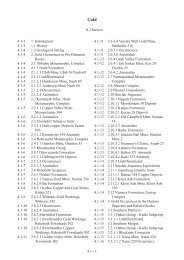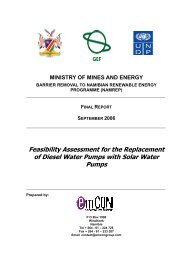STRATEGIC ACTION PLAN - Ministry of Mines and Energy
STRATEGIC ACTION PLAN - Ministry of Mines and Energy
STRATEGIC ACTION PLAN - Ministry of Mines and Energy
Create successful ePaper yourself
Turn your PDF publications into a flip-book with our unique Google optimized e-Paper software.
NNAA MMRREEPP<br />
––<br />
SSTTRRAATTEEGGI IICC AACCTTI IIOONN PPLLAANN FFOORR TTHHEE IIMMPPLLEEMMEENNTTAATTI<br />
I<br />
IIOONN OOFF RREENNEEWWAABBLLEE EENNEERRGGYY<br />
PPOOLLI IICCI IIEESS AASS OOUUTTLLI IINNEEDD IINN I TTHHEE WWHHI IITTEE PPAAPPEERR OONN EENNEERRGGYY PPOOLLI IICCYY<br />
DEVELOPMENT OBJECTIVE 9<br />
SUSTAINABLE DEVELOPMENT<br />
Supporting Statements from the White Paper on <strong>Energy</strong> Policy:<br />
The Namibian Government is committed to the participation <strong>of</strong> rural women in the<br />
design <strong>of</strong> energy appliances, programmes <strong>and</strong> projects, as well as in awareness raising<br />
activities. The Government is also committed to the empowerment <strong>of</strong> previously<br />
disadvantaged Namibians in all aspects <strong>of</strong> the electricity industry. In addition, the<br />
Government will enforce compliance with all relevant environmental legislation <strong>and</strong><br />
socioeconomic policies.<br />
Strategic Aim:<br />
Promote empowerment, socio-economic development <strong>and</strong> environmental protection.<br />
Main Activities:<br />
Co-ordinate institutional cooperation on gender-based energy issues, promote<br />
regionally-based Economic Empowerment, <strong>and</strong> ensure environmental protection<br />
Women <strong>of</strong>ten carry the burden to cater for the energy needs <strong>of</strong> rural households.<br />
Increasingly greater distances have to be covered to gather fuel for cooking, lighting <strong>and</strong><br />
heating. So far, the position <strong>of</strong> women on energy related issues has hardly been taken<br />
into account. The REEE Institute, together with the responsible line Ministries <strong>and</strong> civil<br />
society organisations will introduce gender aspects into energy planning, co-ordinate<br />
institutional cooperation on gender-based energy issues <strong>and</strong> strengthen the energy<br />
planning capacity at national <strong>and</strong> sub-national levels.<br />
The renewable energy <strong>and</strong> energy efficiency market is served by a h<strong>and</strong>-full <strong>of</strong> mostly<br />
Windhoek-based suppliers <strong>and</strong> technicians. The large-scale introduction <strong>of</strong> renewable<br />
energy technologies into rural, <strong>of</strong>f-grid areas is largely hampered by the absence <strong>of</strong><br />
support structures <strong>and</strong> the resulting prohibitive costs related to covering large distances<br />
from Windhoek. The REEE Institute will consider <strong>and</strong> propose mechanisms that will<br />
facilitate a more even regional distribution <strong>of</strong> renewable energy suppliers <strong>and</strong><br />
technicians. The systems could include the establishment <strong>of</strong> joint ventures between<br />
centralised <strong>and</strong> regionally based enterprises, as well as empowerment through local<br />
capacity building initiatives for less-advantaged Namibians.<br />
Increased population pressure results in increased pressure on natural resources as<br />
rural households <strong>of</strong>ten have no choice but to rely heavily on wood to meet their energy<br />
needs <strong>and</strong> the requirement for shelter. This <strong>of</strong>ten happens at the expense <strong>of</strong><br />
environmental sustainability. For this reason, the REEE Institute will assist in the<br />
establishment <strong>of</strong> environmental impact assessments that consider energy needs within<br />
a socio-economic framework. The Institute will exp<strong>and</strong> the scope <strong>of</strong> environmental<br />
impact assessments to consider impacts such as greenhouse gas contribution from<br />
power stations, respiratory diseases from household smoke, etc. within a national, subregional,<br />
regional <strong>and</strong> global perspective.<br />
29




